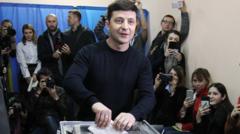In the midst of relentless bombardments by Russia, discussions of holding elections in Ukraine have resurfaced. While the concept seems far-fetched, particularly with ongoing military aggression, residents of Kyiv are speculating about a possible return to the polls. Despite the public's and officials' earlier dismissals of election talks, the situation has shifted with ongoing ceasefire conversations between Moscow and Kyiv.
The last presidential election in Ukraine was held in 2019, and due to martial law enforced following Russia's invasion, a scheduled election in 2024 stands postponed. Nonetheless, the Kremlin continues to challenge President Volodymyr Zelensky's legitimacy, urging new elections as part of ceasefire negotiations—a sentiment echoed by former President Trump.
Recent rumors suggest that Zelensky might be reconsidering the election timeline. Current polls indicate Zelensky’s favorability has increased, and some speculate that the convergence of potential ceasefire agreements could create a favorable environment for elections later this year. Notably, Valerii Zaluzhnyi, Zelensky’s likely chief rival and former army commander, publicly denied rumors of his candidacy, emphasizing the priority of national unity over electoral ambitions during wartime.
However, the head of Ukraine's Central Election Commission noted that legal modifications would be required to hold elections, as existing laws outline specific timelines post-martial law for parliamentary and presidential elections. Reports speculated that a significant meeting discouraged by governmental sources sparked worry regarding miscommunications around electoral intentions.
Despite the formal denouncements, the notion of holding elections remains intriguing. Zelensky's rising popularity suggests he might favor a second term, especially with America viewing elections in Ukraine as imminent. Some speculate that tactical advantages could arise from elections, bolstering his negotiation position with Russia.
Nevertheless, complications abound. The logistics of enabling displaced citizens and those in combat zones to vote raise significant challenges, such as implementing a secure voting infrastructure. The Diia app, which many citizens utilize for administrative tasks, could potentially facilitate electronic voting, though concerns around legislation and cyber vulnerabilities persist.
Critics warn that premature elections might exacerbate political tensions, jeopardizing the integrity of governance during wartime. Poll results show a significant portion of the Ukrainian populace opposes elections even after any conflict resolution, underscoring the hesitance to shift focus from war efforts to political ambitions.
As discussions unfold, the fate of elections in Ukraine remains uncertain, highlighting the challenges of balancing democratic processes with the realities of ongoing warfare.
The last presidential election in Ukraine was held in 2019, and due to martial law enforced following Russia's invasion, a scheduled election in 2024 stands postponed. Nonetheless, the Kremlin continues to challenge President Volodymyr Zelensky's legitimacy, urging new elections as part of ceasefire negotiations—a sentiment echoed by former President Trump.
Recent rumors suggest that Zelensky might be reconsidering the election timeline. Current polls indicate Zelensky’s favorability has increased, and some speculate that the convergence of potential ceasefire agreements could create a favorable environment for elections later this year. Notably, Valerii Zaluzhnyi, Zelensky’s likely chief rival and former army commander, publicly denied rumors of his candidacy, emphasizing the priority of national unity over electoral ambitions during wartime.
However, the head of Ukraine's Central Election Commission noted that legal modifications would be required to hold elections, as existing laws outline specific timelines post-martial law for parliamentary and presidential elections. Reports speculated that a significant meeting discouraged by governmental sources sparked worry regarding miscommunications around electoral intentions.
Despite the formal denouncements, the notion of holding elections remains intriguing. Zelensky's rising popularity suggests he might favor a second term, especially with America viewing elections in Ukraine as imminent. Some speculate that tactical advantages could arise from elections, bolstering his negotiation position with Russia.
Nevertheless, complications abound. The logistics of enabling displaced citizens and those in combat zones to vote raise significant challenges, such as implementing a secure voting infrastructure. The Diia app, which many citizens utilize for administrative tasks, could potentially facilitate electronic voting, though concerns around legislation and cyber vulnerabilities persist.
Critics warn that premature elections might exacerbate political tensions, jeopardizing the integrity of governance during wartime. Poll results show a significant portion of the Ukrainian populace opposes elections even after any conflict resolution, underscoring the hesitance to shift focus from war efforts to political ambitions.
As discussions unfold, the fate of elections in Ukraine remains uncertain, highlighting the challenges of balancing democratic processes with the realities of ongoing warfare.


















